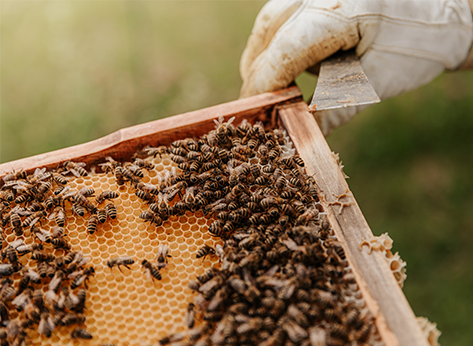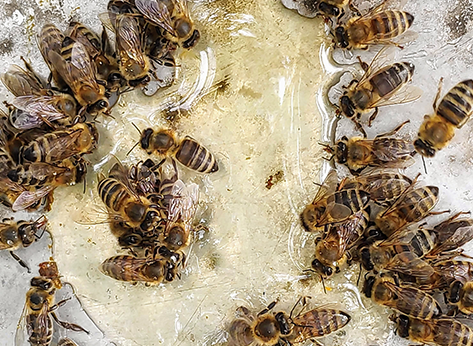A key part of World Bee Day’s purpose is “to raise awareness of the importance of bees and beekeeping”[1]. The fundamental importance of bees cannot be emphasised enough, not only are they a central part of the natural world as one of the most important pollinators, with a significant proportion of the earth’s food production depending upon them, but they are also playing an increasingly important role as part of both wildlife conservation and social uplift.
An innovative approach to mitigating human-elephant conflict, the usage of bees as deterrents for elephants harnesses the elephant’s natural fear of honeybees, ultimately aiding in their protection whilst simultaneously benefitting local farmers and communities. Successfully developed by Lucy King of the Elephants and Bees Project, Beehive Fences are made up of hives, or fake hives, strung at ten metre intervals connected with wire. Upon an elephant’s touch of either the hive or wire, the hive begins to swing, agitating the bees, which causes them to abandon the hive and the elephants flee in fear. Though bees may not appear to have the obvious ability to significantly harm an elephant due to the majority of their body being covered in thick skin, the more sensitive areas, such as their eyes and mouth, are exposed and vulnerable to the bee’s stinger.

Agriculture is a primary source of income for many rural communities across Africa. Elephants are perceived as a threat to their livelihoods due to the raiding and destruction of crops. As a result, elephants may be killed in retaliation for these incidents and with a significant population decline across Africa now leading to the IUCN recognising the African savanna elephant and African forest elephant as endangered and critically endangered respectively, it is crucial to create innovative solutions such as this with the aim of reducing human-elephant conflict.
Not only does this method support the conservation of elephants and reduce conflict, but it also provides numerous benefits to both the natural environment and local communities. The implementation of ‘elephant-friendly honey’ production as an alternative income source increases economic diversity and overall income thus uplifting local communities and farmers. Providing alternative sources of income is essential for a reduction in poaching incidents as a lack of economic diversity is a key factor that contributes to the reliance on the illegal wildlife trade. With an increase in the number and presence of bees in the area, a greater crop yield for farmers is likely due to increased pollination and a reduction in crop raids and damage by the elephants will also increase this yield and thus the overall income. Other methods to reduce human-elephant conflict, such as firecrackers, can cause injury and fatality on both sides as the elephant may become aggressive in response and this may also incite retaliation. In comparison, a method that utilises this natural fear of bees and removes the direct human involvement, reduces possible damage to crops and danger to both humans and elephants, caused by other deterrent methods and responses to such. The positive outcomes of the use of Beehive Fences for both human and elephant are clear to see.

This method has been implemented across Africa proving to be a success in many countries, such as Mozambique and Tanzania. Trialled across three communities in Kenya, the Elephant and Bees Project saw a >80% success rate in the implementation of their Beehive Fences. Following Africa’s lead, Beehive Fences are being trialled and placed across Asia in regions such as Uttara Kannada in south India where Prachi Mehta, research director at the Wildlife Research and Conservation Society (WRCS), has implemented a slightly different version of Beehive Fences in order to decrease the local human-elephant conflict. Similar to the aforementioned hives, hollow logs are strung at ten metre intervals with an interconnecting wire, blocked at either end with holes for bee access containing a mixture of sugar, cinnamon and beeswax to attract the bees. Despite fears of failure due to the native bees being less aggressive than their African counterparts, these beehive fences have proven successful with a significant reduction in elephant raids, leading to this method being adopted by many farmers in the local area.
This World Bee Day, we stress the importance of bees and raising awareness of their diverse ability to affect change through enterprises such as this, aiding in both conservation efforts and the positive socio-economic upliftment of communities.
[1] World Bee Day: https://www.worldbeeday.org/en/about/the-project.html



 By miltongroup, May 20, 2021
By miltongroup, May 20, 2021